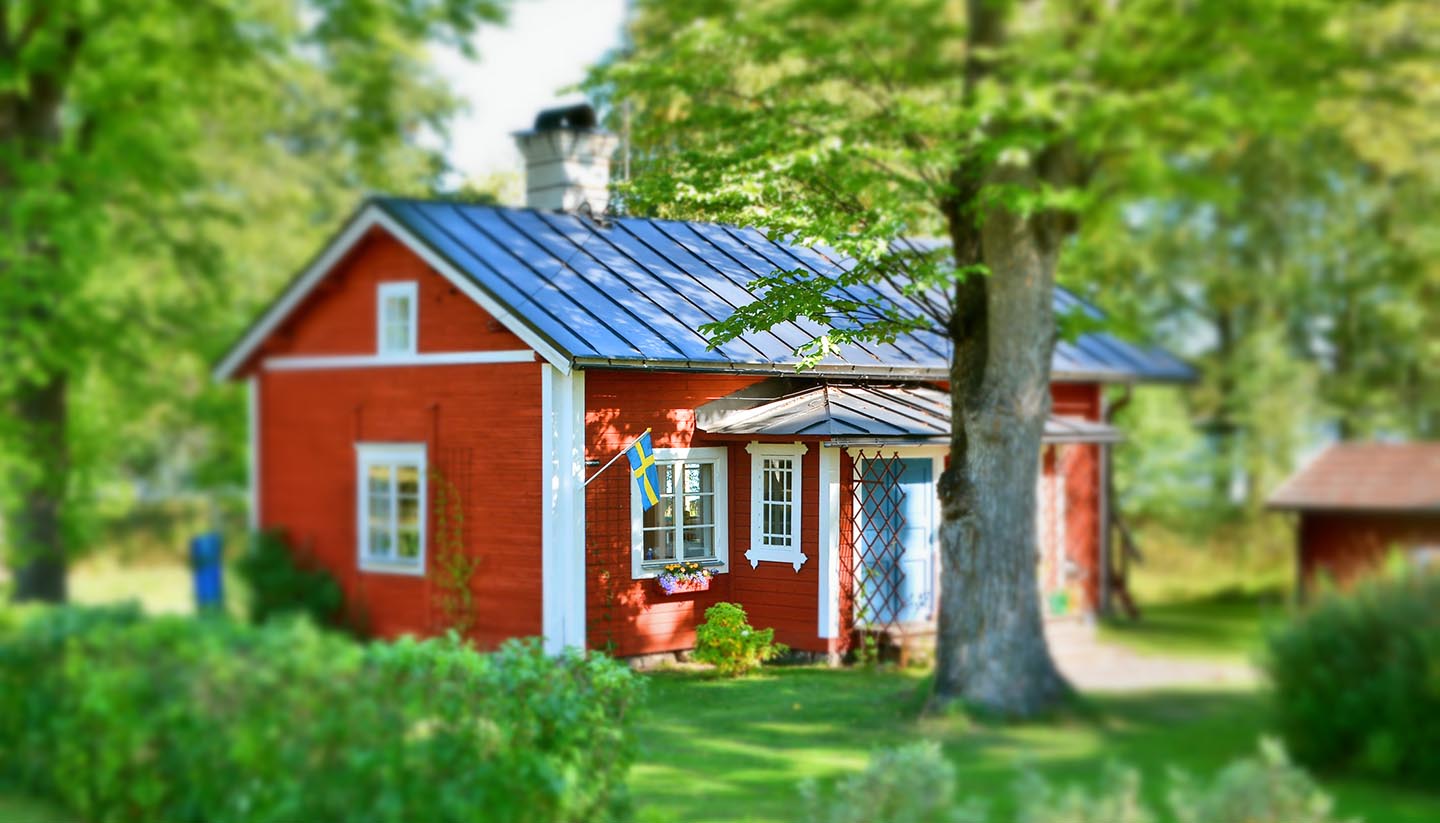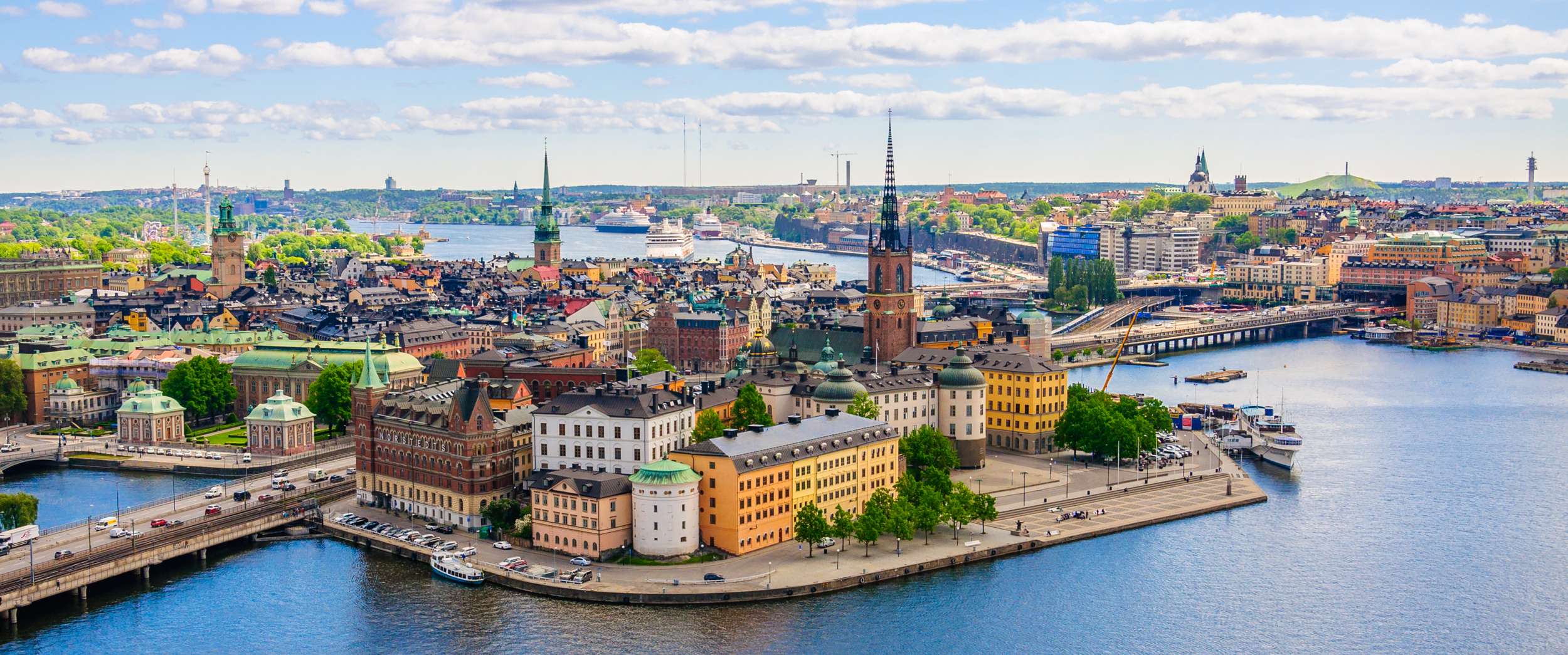Sweden travel guide
About Sweden
Sweden is a land of incredible contrasts, from the dense pine forests and craggy mountains of the north, to the rolling hills and glossy golden beaches of the south. But the diversity doesn't stop at the suburbs, with each of Sweden's seven major cities boasting its own character, history and unique architectural style.
Bordered by Denmark to the south, Norway to the west and Finland to the east, Sweden, the largest of the Scandinavian countries, boasts a long mercantile history that has made it one of the most culturally open and welcoming in Europe.
The instantly likeable capital Stockholm has long been synonymous with style and its sharply tailored brand of chic has percolated throughout the wardrobes of the world. Hipsters notwithstanding, Stockholm, with its 14 islands and medieval beauty, has much to offer those in search of culture, art and historical treasures. However, perhaps the most surprising city is Malmö, which has belied its unfairly grim reputation to become one of the country's liveliest destinations.
Beyond the cities, Sweden's countryside has a gentler charm than the rugged landscapes of neighbouring Norway. Much of Sweden is forested and there are thousands of lakes, including the large stretches of water between Gothenburg and Stockholm. The border with Norway is home to the spectacular Skanderna (Scandinavian) mountain chain, while in the far north you'll find wonderfully bleak Arctic tundra, where you can see the Northern Lights. The south is dominated by emerald forests, the cerulean waters of the Gulf of Bothnia and the jagged Baltic coastline. Of all the lovely spots in Sweden though, the awe-inspiring panoramas of the Stora Sjöfallet National Park take some beating. Part of the UNESCO-listed Laponian region of northern Sweden, the park's majestic waterfalls, soaring peaks and crowded clumps of fir trees make it one of the country's greatest natural treasures.
The Swedes are proud of their green country and believe the great outdoors should be available to everyone. Allemansrätten – the everyman's right – is a constitutional right that allows the public access to public and privately owned land for recreation. As long as you do not disturb or destroy nature, or infringe on the privacy of others (such as by walking too close to their house), you are free to roam the countryside. This right even allows people to pick wildflowers, berries and mushrooms – unless they are endangered.
Key facts
449,964 sq km (173,732 sq miles).
9,851,852 (UN estimate 2016).
21.8 per sq km.
Stockholm.
Constitutional monarchy.
King Carl XVI Gustaf since 1973.
Prime Minister Ulf Kristersson since October 2022.
Travel Advice
The Foreign, Commonwealth & Development Office (FCDO) provides advice about risks of travel to help British nationals make informed decisions. Find out more about FCDO travel advice.
Before you travel
No travel can be guaranteed safe. Read all the advice in this guide as well as support for British nationals abroad which includes:
-
advice on preparing for travel abroad and reducing risks
-
information for women, LGBT+ and disabled travellers
Follow and contact FCDO travel on Twitter, Facebook and Instagram. You can also sign up to get email notifications when this advice is updated.
Travel insurance
If you choose to travel, research your destinations and get appropriate travel insurance. Insurance should cover your itinerary, planned activities and expenses in an emergency.
This advice reflects the UK government’s understanding of current rules for people travelling on a full ‘British citizen’ passport from the UK, for the most common types of travel.
The authorities in Sweden set and enforce entry rules. If you’re not sure how these requirements apply to you, contact the Swedish Embassy in the UK.
COVID-19 rules
There are no COVID-19 testing or vaccination requirements for travellers entering Sweden.
Accompanied under-18s
Carry a letter of consent from the parent or guardian of children under 18 who are travelling with you.
Passport validity requirements
To travel to Sweden, you must follow the Schengen area passport requirements.
To enter Sweden (and all Schengen countries) your passport must:
- have a ‘date of issue’ less than 10 years before the date you arrive. Passports issued after 1 October 2018 are now valid for only 10 years, but for passports issued before 1 October 2018, extra months may have been added if you renewed a passport early
- have an ‘expiry date’ at least 3 months after the day you plan to leave
Check with your travel provider that your passport and other travel documents meet requirements. Renew your passport if you need to.
You will be denied entry if you do not have a valid travel document or try to use a passport that has been reported lost or stolen.
Checks at border control
Make sure you get your passport stamped.
If you’re a visitor, your passport must be stamped when you enter or leave the Schengen area (which includes Sweden). Border guards will use passport stamps to check you haven’t overstayed the 90-day visa-free limit for stays in the Schengen area. If your passport was not stamped, border guards will presume you have overstayed the visa-free limit.
If your passport was not stamped, show evidence of when and where you entered or left the Schengen area (for example, boarding passes or tickets) and ask the border guards to add the date and location in your passport.
If you live in Sweden, read our Living in Sweden guide for passport stamping information.
At Swedish border control, you may also need to:
- show proof of your accommodation
- show proof of your travel insurance
- show a return or onward ticket
- prove that you have enough money for your stay
Border controls on arrival from Denmark and Germany
Border controls are in place in Sweden for people travelling from Denmark via the Öresund crossing and arriving on ferries from Denmark and Germany.
Visa requirements
You can travel without a visa to the Schengen area (which includes Sweden) for up to 90 days in any 180-day period. This applies if you travel:
- as a tourist
- to visit family or friends
-
to attend business meetings, cultural or sports event
- for short-term studies or training
If you’re travelling to Sweden and other Schengen countries without a visa, make sure your whole visit is within the 90-day limit. Visits to Schengen countries in the 180 days before you travel count towards your 90 days.
To stay longer (to work or study, for business travel or for other reasons), you must meet the Swedish government’s entry requirements. Check which type of visa or work permit you need with the Swedish Embassy in the UK.
If you stay in Sweden with a residence permit or long-stay visa, this does not count towards your 90-day visa-free limit.
Vaccination requirements (other than COVID-19)
At least 8 weeks before your trip, check the vaccinations and vaccination certificates you may need in TravelHealthPro’s Sweden guide.
Customs rules
There are strict rules about goods that can be brought into and taken out of Sweden. You must declare anything that may be prohibited or subject to tax or duty.
Taking food and drink into the EU
You cannot take meat, milk or products containing them into EU countries. There are some exceptions for medical reasons, for example certain amounts of powdered infant milk, infant food, or pet food. Check the rules about taking food and drink into the EU on the European Commission website.
Taking money into Sweden
Many shops, cafes and restaurants do not accept cash, so make sure you have a debit or credit card with you.
Terrorism
There is a high threat of terrorist attack globally affecting UK interests and British nationals, including from groups and individuals who view the UK and British nationals as targets. You should remain vigilant at all times.
UK Counter Terrorism Policing has information and advice on staying safe abroad and what to do in the event of a terrorist attack. Find out how to reduce your risk from terrorism while abroad.
Terrorism in Sweden
Terrorists are very likely to try to carry out attacks in Sweden. Attacks could be indiscriminate, including in places frequented by foreigners.
The authorities in Sweden have successfully disrupted a number of planned attacks and made a number of arrests.
Political demonstrations
Demonstrations in Sweden are usually peaceful. Avoid demonstrations wherever possible and follow the advice of the local authorities.
Crime
Protecting your belongings
Take particular care of your belongings in major cities as pickpockets often target tourists for passports and cash.
Violent crime does occur. Gang-related crime, including knife crime, shootings and explosions, have been reported in Malmö, Stockholm and Gothenburg.
Scams
Check carefully whether any job offers are genuine. Contact the British Embassy in Stockholm for more advice if necessary.
Laws and cultural differences
There are heavy punishments for importing illegal drugs. There is zero tolerance towards drugs; even petty drug use will lead to a penalty.
Paying for sex is illegal.
Physical punishment of children is illegal.
LGBT+ travellers
Same-sex relationships are legal in Sweden. Read more advice for LGBT+ travellers.
Transport risks
Road travel
You can drive in Sweden on your UK driving licence.
If you are planning to drive in Sweden, see information on driving abroad and read the RAC’s Sweden guide.
During winter, snow and ice on the roads cause accidents daily. From 1 December to 31 March, and any other times designated by the police, all vehicles must have winter tyres.
Extreme weather and natural disasters
Arctic travel
Parts of Sweden are in the Arctic Circle, including some very remote areas of land. Emergency medical assistance and search and rescue are limited in these areas. See Arctic travel safety advice.
Before you travel check that:
- your destination can provide the healthcare you may need
- you have appropriate travel insurance for local treatment or unexpected medical evacuation
This is particularly important if you have a health condition or are pregnant.
Emergency medical number
Dial 112 and ask for an ambulance.
Contact your insurance or medical assistance company promptly if you’re referred to a medical facility for treatment.
For more information read guidance on healthcare when travelling in Europe.
Vaccinations and health risks
At least 8 weeks before your trip check:
-
the latest information on vaccinations and health risks in TravelHealthPro’s Sweden guide
-
where to get vaccines and whether you have to pay on the NHS travel vaccinations page
Medication
The legal status and regulation of some medicines prescribed or bought in the UK can be different in other countries.
Read best practice when travelling with medicines on TravelHealthPro.
The NHS has information on whether you can take your medicine abroad.
Healthcare facilities in Sweden
FCDO has a list of English-speaking doctors in Sweden.
There is also guidance on healthcare if you’re living in Sweden.
If you’re visiting remote areas, consider how easily you will be able to access emergency services.
COVID-19 healthcare in Sweden
If you have any COVID-19 symptoms check the public health agency of Sweden for advice and contact numbers.
Health insurance cards
Apply for a free UK Global Health Insurance Card (GHIC) before leaving the UK. If you already have a European Health Insurance Card (EHIC), it will still be valid as long as it remains in date.
The GHIC or EHIC entitles you to state-provided medical treatment necessary during your trip. Any treatment provided is on the same terms as Swedish nationals. If you do not have your card with you or you’ve lost it, contact the NHS Overseas Healthcare Team.
It’s important to take out appropriate travel insurance for your needs. A GHIC or EHIC is not an alternative to travel insurance and you should have both before you travel. A GHIC or EHIC does not cover all health-related costs, for example, medical repatriation, ongoing medical treatment and non-urgent treatment. Read more about what your travel insurance should cover.
GHIC and EHIC cover state healthcare only, not private treatment. You will be responsible for the cost of any treatment provided by a private doctor or private clinic.
Travel and mental health
Read FCDO guidance on travel and mental health. There is also mental health guidance on TravelHealthPro.
The Foreign, Commonwealth & Development Office (FCDO) cannot provide tailored advice for individual trips. Read this travel advice and carry out your own research before deciding whether to travel.
Emergency services in Sweden
Telephone: 112 (ambulance, fire, police)
Contact your travel provider and insurer
Contact your travel provider and your insurer if you are involved in a serious incident or emergency abroad. They will tell you if they can help and what you need to do.
Refunds and changes to travel
For refunds or changes to travel, contact your travel provider. You may also be able to make a claim through insurance. However, insurers usually require you to talk to your travel provider first.
Find out more about changing or cancelling travel plans, including:
- where to get advice if you are in a dispute with a provider
- how to access previous versions of travel advice to support a claim
Support from FCDO
FCDO has guidance on staying safe and what to do if you need help or support abroad, including:
- finding English-speaking lawyers, funeral directors and translators and interpreters in Sweden
- dealing with a death in Sweden
- being arrested or imprisoned in Sweden
- getting help if you’re a victim of crime
-
what to do if you’re in hospital
- if you’re affected by a crisis such as a terrorist attack
Contacting FCDO
Follow and contact FCDO travel on Twitter, Facebook and Instagram. You can also sign up to get email notifications when this travel advice is updated.
Help abroad in an emergency
If you are in Sweden and you need emergency help from the UK government, contact the British Embassy in Stockholm.
You can also contact FCDO online.
FCDO in London
You can call FCDO in London if you need urgent help because something has happened to a friend or relative abroad.
Telephone: 020 7008 5000 (24 hours)
Risk information for British companies
The Overseas Business Risk service offers information and advice for British companies operating overseas on how to manage political, economic, and business security-related risks.




